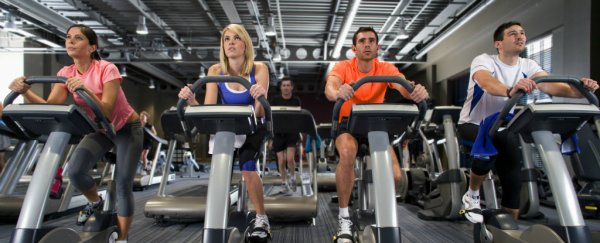Athletes and personal trainers have known for some time that a few minutes of intense exercise can produce the same effects as a longer but less demanding workout: and now scientists think they know why. As Time reports, researchers at the Karolinska Institute in Stockholm have found that a chemical reaction inside the body's muscles causes them to produce more energy and work more efficiently as a result.
For their research, the scientists studied muscle samples taken from volunteers after they had been through six cycles of pedalling quickly for 30 seconds and then resting for three minutes. The exercise caused the chemicals regulating calcium changes to break down — that in turn caused the energy and efficiency boost, due to an increase in the production of mitochondria, the 'power plants' that provide cells with energy.
"What we found was a breakdown of these [chemical channels] that was totally unexpected," the Institute's Hakan Westerblad said. "We have never seen anything similar. We saw a large production of free radicals, and these free radicals were specifically hitting the calcium channels. Normal training also increases the amount of free radicals, but not by as much as interval training."
It seems that our cells go into a emergency mode when put under the extreme pressure of an intense workout, although elite athletes who are accustomed to high-intensity interval training (HIIT) see less of a benefit over time — what happens is the body gradually adapts to these quick bursts of activity and becomes better prepared to deal with them.
"During any physical training, the cell senses, 'I have a problem here,'" adds Westerblad. "So to be better safe than sorry, they adapt so the next time they experience the intense exercise, the problem is lessened."
For most people below the level of professional athlete, the benefits of HIIT can prove significant: Westerblad and his colleagues found evidence of molecular changes could still be spotted some 24 hours after the original exercise, even though the participants in the study had only been cycling for a total of three minutes. There are caveats, however — the research found that antioxidants such as vitamin E and C (often found in dietary supplements) can prevent this kind of biological reaction.
So the next time you hit the gym for some quick and intense exercises, you'll know the chemical reactions going on behind them — just make sure you keep it up on a regular basis. The findings of the Karolinska Institute have now been published in the journal PNAS.
